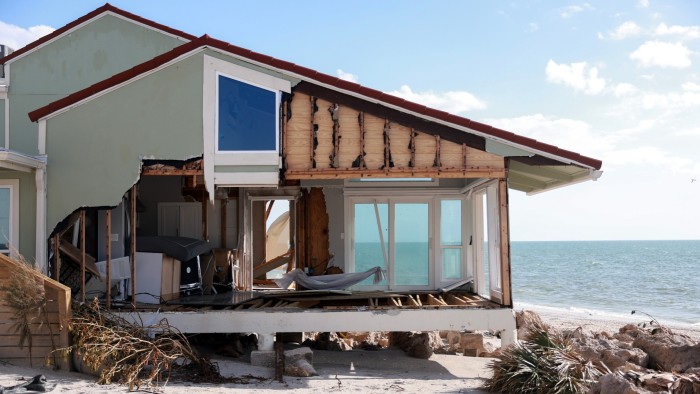Unlock the Editor’s Digest for free
Roula Khalaf, Editor of the FT, selects her favourite stories in this weekly newsletter.
Insurance losses from natural catastrophes, such as floods and hurricanes, are on track to exceed $135bn this year, prompting calls from the world’s biggest insurers for more action to tackle climate change.
Two-thirds of global losses were in the US, where two hurricanes devastated Florida in September and October, according to a new report by Swiss Re.
Intense flooding in Europe, in particular Spain, resulted in the second-highest insured losses from floods in the region ever, according to Swiss Re estimates.
It was the third-costliest year for flooding globally and the second costliest for Europe which had insured losses of approximately $10bn.
Intense rainfall in April caused floods in the Gulf region, disrupting operations at Dubai International, one of the world’s busiest airports. In September, Storm Boris caused floods in central Europe, mainly affecting the Czech Republic, Poland and Austria.
This is the fifth consecutive year that natural catastrophe losses have passed $100bn, prompting calls for more investment in measures to tackle the root causes of severe weather.
“With 1.54°C above the pre-industrial average, 2024 is set to become the hottest year on record,” said the Swiss Re report.
“A warming climate favours the occurrence of many of the natural catastrophes observed in 2024.”
Balz Grollimund, Swiss Re’s head of catastrophe perils, said: “Investing in mitigation and adaptation measures must become a priority.”
The report came days after Munich Re, another reinsurer, said losses from the 2024 US tropical cyclone season were “far above” the 10-year average.
“While the total number of tropical cyclones this season was unremarkable, what stands out is the rapid intensification of severe storms, characterised by extreme rainfall,” said Munich Re.
“This phenomenon is increasingly linked to the impacts of climate change.”
Re-insurers, such as Swiss Re and Munich Re, provide insurance for the insurance companies that provide cover for individuals and businesses.
The end of year is a critical time for the sector with many primary insurers looking to renew their reinsurance cover.
In an investor update in November, Swiss Re said large natural catastrophe claims amounted to $813mn in the first nine months of 2024, with $743mn attributed to the third quarter.
This mainly related to a severe hailstorm in August that hit Calgary in Canada; Storm Boris in Europe and hurricanes Debby and Helene in the US.
Swiss Re reported net income of $2.2bn for the first nine months of the year. Chief executive Andreas Berger said enhancing the resilience of the business had been a priority for the management team.



